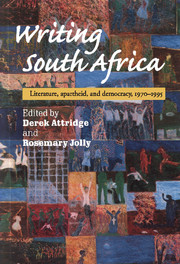Book contents
- Frontmatter
- Contents
- Contributors
- Acknowledgements and note on references
- South Africa, 1930–1996: a chronology
- Maps
- 1 Introduction
- 2 Interrogating silence: new possibilities faced by South African literature
- 3 I am dead: you cannot read: André Brink's On the Contrary
- 4 Endings and new beginning: South African fiction in transition
- 5 The post-apartheid sublime: rediscovering the extraordinary
- 6 Postmodernism and black writing in South Africa
- 7 Shame and identity: the case of the coloured in South Africa
- 8 A man's world: South African gay writing and the State of Emergency
- 9 The final safari: on nature, myth, and the literature of the Emergency
- 10 Interview
- 11 Speech and silence in the fictions of J.M.Coetzee
- 12 ‘Dialogue’ and ‘fulfilment’ in J.M. Coetzee's Age of Iron
- 13 Interview
- 14 Inside out: Jeremy Cronin's lyrical politics
- 15 Spinning out the present: narrative, gender, and the politics of South African theatre
- 16 South African theatre in the United States: the allure of the familiar and of the exotic
- Position papers
- 17 Preparing ourselves for freedom
- 18 Challenges facing theatre practitioners in the new South Africa
- 19 Current trends in Theatre for Development in South Africa
- Select bibliography: South African literary writing in English, 1970–1995
- Index
19 - Current trends in Theatre for Development in South Africa
Published online by Cambridge University Press: 05 July 2011
- Frontmatter
- Contents
- Contributors
- Acknowledgements and note on references
- South Africa, 1930–1996: a chronology
- Maps
- 1 Introduction
- 2 Interrogating silence: new possibilities faced by South African literature
- 3 I am dead: you cannot read: André Brink's On the Contrary
- 4 Endings and new beginning: South African fiction in transition
- 5 The post-apartheid sublime: rediscovering the extraordinary
- 6 Postmodernism and black writing in South Africa
- 7 Shame and identity: the case of the coloured in South Africa
- 8 A man's world: South African gay writing and the State of Emergency
- 9 The final safari: on nature, myth, and the literature of the Emergency
- 10 Interview
- 11 Speech and silence in the fictions of J.M.Coetzee
- 12 ‘Dialogue’ and ‘fulfilment’ in J.M. Coetzee's Age of Iron
- 13 Interview
- 14 Inside out: Jeremy Cronin's lyrical politics
- 15 Spinning out the present: narrative, gender, and the politics of South African theatre
- 16 South African theatre in the United States: the allure of the familiar and of the exotic
- Position papers
- 17 Preparing ourselves for freedom
- 18 Challenges facing theatre practitioners in the new South Africa
- 19 Current trends in Theatre for Development in South Africa
- Select bibliography: South African literary writing in English, 1970–1995
- Index
Summary
With the emergence of the Black Consciousness Movement in the early 1970s, the politics inside South Africa changed from protest to challenge. Theatre not only reflected the change from protest to challenge, but in many respects was catalytic in it. In line with what was happening in the liberation struggle, Theatre for Resistance replaced Protest Theatre as the dominant mode of expression in the country. This happened when the political movement of the time decided to use culture and its products – including theatre – as weapons of the struggle. There was no longer any room, therefore, for Protest Theatre which by its very nature addressed itself to the oppressor with the view of appealing to his conscience. Cultural activists of the time felt that Protest Theatre, practised by both black and white intermediate classes, merely made a statement of disapproval or disagreement, but did not go beyond that. It was a theatre of complaint, of weeping, of self-pity, of moralizing, of mourning, and of hopelessness. It did not offer any solution beyond the depiction of the sad situation in which the oppressed found themselves. The best known practitioner of Protest Theatre was Athol Fugard. In the later phase of his career, Gibson Kente also turned to writing plays with overtly political content, creating Protest Theatre.
- Type
- Chapter
- Information
- Writing South AfricaLiterature, Apartheid, and Democracy, 1970–1995, pp. 257 - 264Publisher: Cambridge University PressPrint publication year: 1998
- 3
- Cited by



